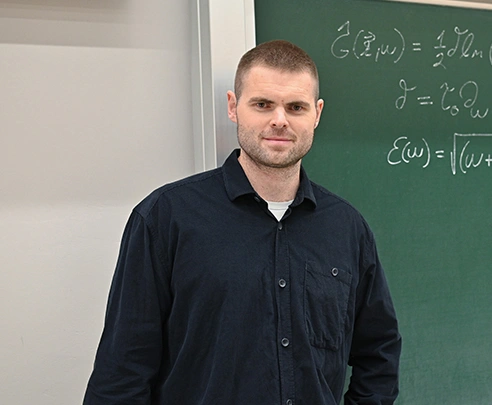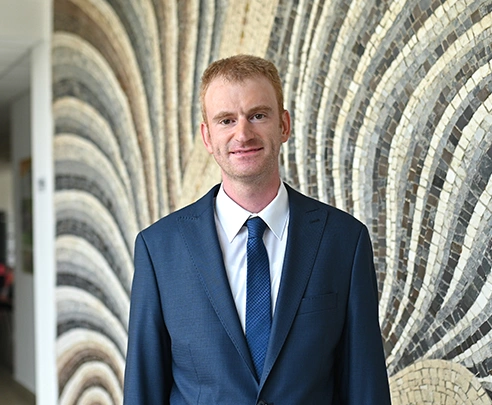Tuberculosis is often seen as a historical problem, but the opposite is true – it is still the world's deadliest infectious disease, with 10 million cases a year. Slovakia and the Czech Republic, where hundreds of cases are recorded every year, are no exception. Mgr. Matúš Dohál, PhD., who works at the Biomedical Centre Martin, part of the Jessenius Faculty of Medicine at Comenius University, has made this serious and prolonged infectious disease the core of his research. He focuses primarily on drug-resistant forms of tuberculosis and understanding their spread in the population.
For the least severe forms of tuberculosis, treatment lasts at least four months and consists of a combination of four different antibiotics. However, a large percentage of cases worldwide resist these common medications, and treatment does not affect them. Resistant forms of tuberculosis are curable but require rapid and accurate diagnosis. Current diagnostic methods have their limitations, which can lead to their further spread or even death if there is no correct and quick intervention.
„For us to be able to eliminate tuberculosis worldwide, we need to quickly and accurately diagnose drug-resistant forms of this disease. My research focuses on identifying new gene mutations encoding resistance to antituberculosis drugs and on improving and speeding up their diagnosis. It is also important to seek out tuberculosis sources and transmission chains so that we can efficiently monitor and control the spread of these resistant forms of tuberculosis in populations,“ he explains.
For the last two years, he has also been studying how the number of patients with resistant forms of tuberculosis changes in the context of migration from Ukraine, where most of the cases in Europe are.„We were able to work on a study together with the University of Oxford, Imperial College London, as well as the Kharkiv hospital. We were able to clarify the origin of the infection in many patients who were diagnosed in Slovakia or the Czech Republic and to find out at what time they might have been infected and whether it was still in Ukraine or whether this happened after migration. These results enable us to introduce relevant measures to prevent further spreading in the population,“ he adds.
One of the most notable achievements of his research has been the identification of new genetic mutations that confer resistance to key tuberculosis drugs. These mutations have been included in the World Health Organization's catalogue, which helps in effective diagnosis and treatment. He and his team also identified the first cases of resistance to new-generation antituberculosis drugs in Slovakia and the Czech Republic, making them part of a pan-European collaboration focused on the evolutionary origins of such resistant strains. They have also conducted several molecular epidemiological studies that have explained the chains of transmission and succeeded in identifying outbreaks, thus preventing the further spread of resistant forms.
Matúš Dohál presently also researches paediatric tuberculosis. He dreams of making the diagnosis of tuberculosis in paediatric patients easier and faster through the development of new tests.
Matúš Dohál is a graduate of microbiology and virology at the Faculty of Natural Sciences at Comenius University Bratislava and a postgraduate student of pharmacology at the Jessenius Faculty of Medicine at Comenius University in Martin. He came to the study of tuberculosis on the basis of his then supervisor, now colleague, Professor Juraj Mokrý, who was also actively involved in this disease. He was particularly interested in this field because he saw the potential for applying research to clinical practice. It was the Biomedical Centre Martin of the Faculty of Medicine of Comenius University that had all the necessary technical equipment to be able to carry out their planned research.
Over the last year, Matúš Dohál has been pleasantly surprised by the funding of science and he thinks that there are certainly more opportunities to apply for grants today than there used to be. Funding is essential for the continuation of research that moves society forward. He claims that everything around us confirms the importance of science, as we are in daily contact with it.„We are where we are today thanks to science-based methods and approaches. Science is important because it educates mankind and, for me especially, because it helps mankind,“ he says.
Science brought him not only the ability to navigate various manuals and instructions, a skill that he obtained during constant study of protocols in the laboratory, but also his wife, whom he met during his studies. When he is not studying or teaching his students, he is hiking with his dog or biking in the surrounding hills. For the last eight months, he has been devoting his time to his young son, getting him ready for hiking – though for now only in a carrier.

